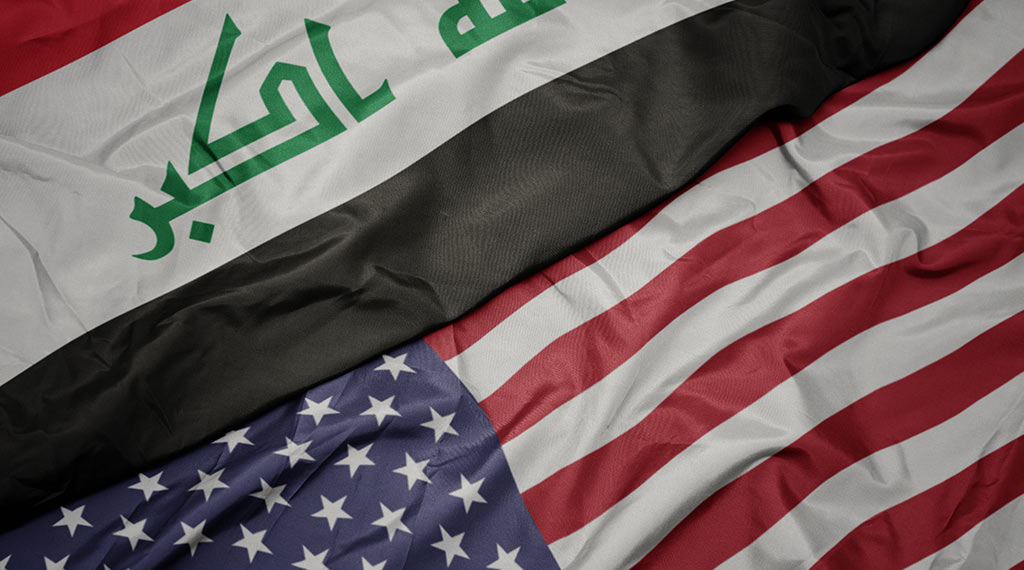The United States is ending its combat mission in Iraq, President Joe Biden announced in a joint statement with Iraqi Prime Minister Mustafa al-Kadhimi on July 26. The U.S. presence on the ground will evolve into a training and advisory role by the end of the year, allowing the Iraqi Security Forces (ISF) to execute counter-terrorism missions independently.
There are currently 2,500 American troops remaining in the U.S., and Biden’s recent announcement indicates that there will not be a significant reduction in these numbers within the year. In fact, the U.S. mission in Iraq will not be changing following the Biden-Kadhimi meeting, despite the marketing surrounding the U.S.-Iraq talks suggesting that a major shift in the U.S.’s Iraq policy is imminent.
Since the outset of his premiership, al-Kadhimi has struggled to counter rogue Iran-backed militias that function outside of Iraqi law. These Tehran-directed militant groups openly defy the Iraqi government and remain the largest roadblock hindering a strengthened U.S.-Iraq partnership.
The prime minister had prioritized achieving Iraqi sovereignty and limiting foreign intervention in Iraqi polity and society. Iran-supported militants obstruct these goals by using Iraq as a battleground to carry out attacks targeting U.S. assets on the ground, killing off anti-Iranian activists and demonstrators, and conducting wide-scale misinformation campaigns.
Iranian militias have also pressured the prime minister to expel all remaining American military and diplomatic personnel from the country. In the first few series of strategic dialogue talks in 2020, which took place during the Trump administration, then-Secretary of State Mike Pompeo threatened to close the U.S. embassy in Baghdad and limit U.S.-Iraq cooperation, unless al-Kadhimi would tighten his grip on the Iran-backed militias that continuously attacked American troops on the ground.
This kind of rhetoric has not been mirrored by Biden officials in the third and fourth rounds of U.S.-Iraq talks. In fact, in the previous set of strategic talks, Iranian influence was not discussed at all.
However, simultaneous to the U.S.-Iraq meeting, Iranian militias essentially took over central Baghdad, spreading propaganda and threatening messages to onlookers. The armed militiamen threatened to cut off al-Kadhimi’s ear if U.S. troops were not immediately expelled from the country.
Al-Kadhimi will face nationwide elections in October, and the pressure surrounding this significant vote puts the prime minister in a tough spot. Viewed by Washington as Iraq’s most capable leader, al-Kadhimi must balance U.S.-Iranian interests delicately.
A resurgence of ISIS activity in Iraq is also a cause for concern. In late June 2020, a suicide attack claimed by ISIS in Sadr City killed dozens of civilians. American troops have aided the ISF in counter-terrorism efforts targeting ISIS cells in the country, and ending this support may hamper the progress that the joint force has made.
Although the latest round of U.S.-Iraq talks was marketed by the White House as a significant evolution in America’s Iraq mission, the only real change is in terminology. Al-Kadhimi is likely trying to appease anti-Iranian sentiment in his country while balancing mounting pressure by militias to take action against the U.S. presence.
The Biden administration is currently dealing with the ramifications surrounding the decision to hastily withdraw American troops from Afghanistan, including the countless atrocities being committed by the Taliban targeting civilians and former interpreters for the United States. Considering these elements, maintaining the status quo makes sense for both parties.

